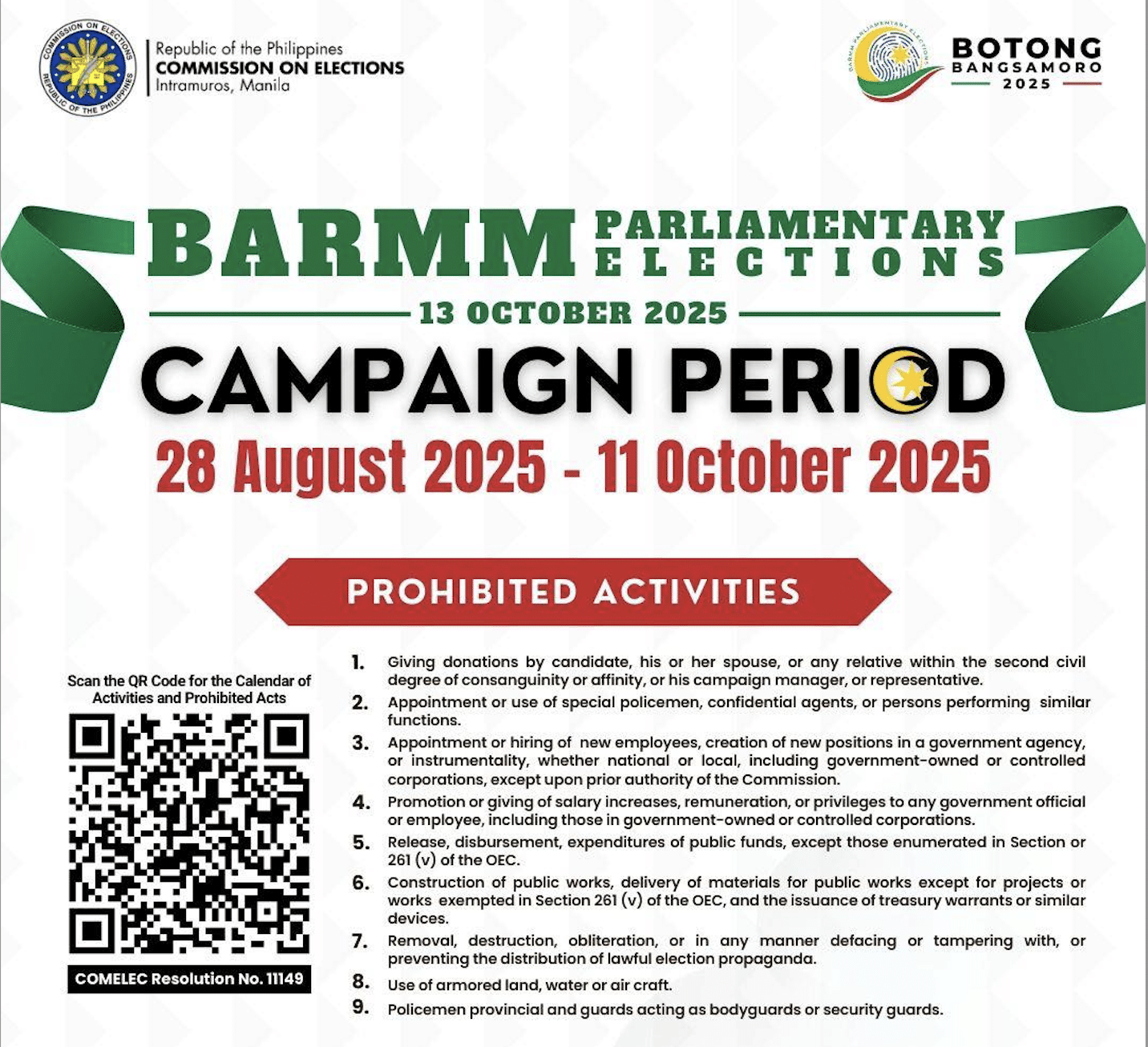Comelec warns vs vote-buying in BARMM polls

The Commission on Elections has warned against vote-buying and other election offenses as it announced the start of the campaign period for the Bangsamoro parliamentary elections in a Facebook post on Wednesday, August 27, 2025. — Photo from Comelec/Facebook
MANILA, Philippines — As the campaign period for the first Bangsamoro Parliamentary elections begins on Thursday, the Commission on Elections (Comelec) on Wednesday warned that candidates and political parties may be disqualified from running for their posts if they commit vote-buying.
Comelec Chairperson George Erwin Garcia said that the Comelec will start enforcing election laws at the start of the campaign period in the Bangsamoro Autonomous Region in Muslim Mindanao (BARMM). He noted that the poll body will also apply what they implemented for the May 2025 midterm elections.
“We will not hesitate to disqualify candidates, just like what we proved before, and we will not hesitate to file criminal cases [against them],” Garcia told reporters in an interview.
“We will always use the full force of the law against anybody who will use vote buying to thwart the will of the electorate in the Bangsamoro Parliamentary elections,” Garcia added.
Under Section 262 of the Omnibus Election Code (OEC), vote-buying is considered an election offense.
READ: From e-cash to ayuda: The many ways corrupt bets buy votes
Garcia said that the poll body will not allow vote-buying to prosper during the campaign period for the parliamentary elections, noting that the Committee on Kontra Bigay (CKB) will be in full force to crack down on the illegal act.
Aside from this, Task Force Baklas, Task Force KKK (Katotohanan, Katapatan at Katarungan sa Halalan), and Task Force Safe (Safeguarding Against Fear and Exclusion in Elections) will also be operational.
The CKB was launched to enforce strict mechanisms against vote-buying, as well as vote-selling and abuse of state resources. It is also tasked to assist law enforcement authorities to identify acts of vote-buying, vote-selling, and abuse of state resources and to gather evidence “that may aid in the arrest of suspected individuals who would commit these election offenses.”
In the recent midterm elections, the Comelec received several complaints of vote-buying and abuse of state resources. The poll body issued show cause orders to many candidates for them to explain the allegations of election offense thrown at them.
It also disqualified Matt Ervin Florido, a congressional candidate from Quezon province, due to alleged vote-buying. This stemmed from a complaint wherein petitioners alleged that last April 5, they were invited by Florido to a gathering where they allegedly distributed P1,000 cash, with the candidate openly soliciting the votes of the candidates.
The disqualification was recently upheld by the Supreme Court, emphasizing that the “lack of receipts, logbooks, or other records indicated that the funds were used to influence voters — constituting vote-buying under the Omnibus Election Code.”
Meanwhile, Garcia asked for the help of seven political parties to ensure safe and peaceful elections in the region.
“We are asking for your help so that you may assist us in ensuring an orderly campaign and orderly candidates, so that we can prove that we are capable of having orderly elections in Bangsamoro,” he said.
Aside from vote-buying, Comelec also prohibits the following activities during the campaign period:
- Giving donations by candidate, his or her spouse, or any relative within the second civil degree of consanguinity, or his campaign manager or representative
- Appointing or using police officers, confidential agents, or persons performing similar functions
- Appointing or hiring new employees, creating new positions in a government agency, whether national or local, including government-owned or controlled operations without prior approval from Comelec
- Promoting or giving salary increases, remuneration, or privileges to government officials or employees
- Releasing, disbursing, spending public funds, except those enumerated in Section261(v) of OEC
- Constructing public works, delivering materials for public works except for projects or works exempted in Section 261(v) of OEC, and issuance of treasury warrants or similar devices
- Removing, constructing, obliterating, or an manner defacing or tampering with, or preventing distribution of lawful election materials
- Using armored land, water, or aircraft
- Using policemen and guards as bodyguards or security guards
Voter education for Bangsamoro voters
Garcia also said that the poll body’s month-long voter education campaign is hoping to raise the trust and willingness of the Bangsamoro voters to participate in the elections. He added that the poll body must be able to explain to the voters why there is a looming redistribution of seven seats originally dedicated to Sulu province and its implications to the elections.
The Bangsamoro Transition Authority earlier announced the passage on the third and final of Parliament Bill No. 351, which seeks to amend the Bangsamoto Autonomy Act No. 58 and redistribute the seven district seats originally dedicated to Sulu.
A Supreme Court ruling in September 2024 excluded Sulu from BARMM after it rejected the ratification of the Bangsamoro Organic Law through a plebiscite.
READ: Comelec to resume ballot printing for BARMM polls on Aug. 29
The passage of the bill prompted the Comelec to suspend its printing of official ballots for Tawi-Tawi, Basilan, and the Special Geographic Area last week. However, he announced on Wednesday that the poll body will resume the printing of the ballots on Thursday, with no changes in the ballot faces.
Garcia also announced that the poll body will proceed with its preparations for the 73 parliamentary seats, instead of 80, for the elections. Garcia explained that based on review, the poll body will fall short for its preparations for the elections if it will wait for the fate of the approved bill, should it be vetoed or signed by BARMM Chief Minister Abdulraof Macacua. /das


















